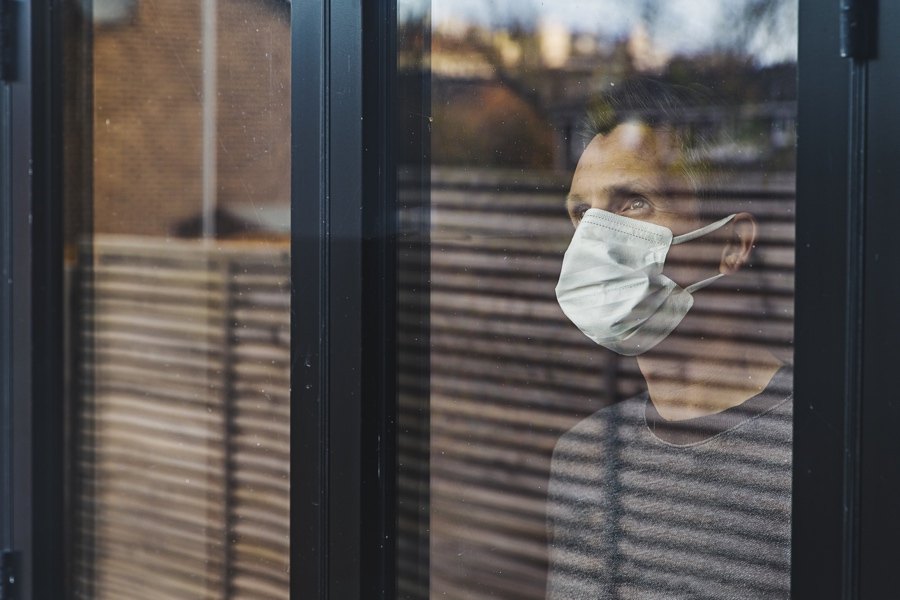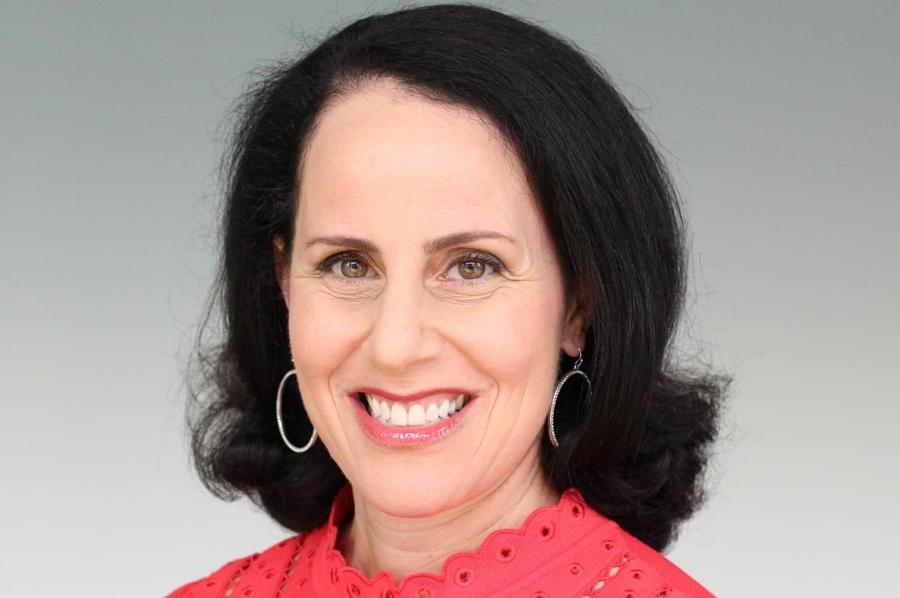Will We All Have PTSD from Dealing with COVID-19?
A local psychotherapist weighs in on the long-term psychological effects of quarantine and coronavirus.

Stress and trauma can come from self-isolating at home during the COVID-19 pandemic. | Photo by Justin Paget for Getty.
Anxiety is skyrocketing during the COVID-19 pandemic, with 30 percent of Americans saying the crisis is having a “serious impact” on their mental health, and most saying it is affecting their daily lives, according to the American Psychiatric Association. Local trauma therapist Shari Botwin, LCSW and author of Thriving After Trauma: Stories of Living and Healing explains that the social upheaval and anxiety from the virus may have long-term effects on our mental health, including causing post-traumatic stress disorder.
Philadelphia magazine: Can you first just tell me a little bit about yourself and the trauma work you’ve been doing?
Botwin: I have been counseling survivors of all types of trauma and abuse in my Cherry Hill Private Practice for over 23 years, from sexual assault and domestic violence to the trauma of combat and sudden loss. During COVID-19, I’ve been writing about the impact of the quarantine and the symptoms of PTSD that people are starting to report, along with the disappointments, loss, and grief people are experiencing. This is the first time since I’ve been working as a therapist that I’m simultaneously experiencing the same type of trauma as well. People don’t understand what it means to be a trauma survivor unless you’ve had trauma. This is a situation where, to some degree, most people understand some version of this same trauma because of the wide-ranging effects of COVID.
Some of us might be feeling badly, but not have the language to express that this may be trauma. Can you talk a little more about understanding this collective experience as trauma?
The piece that people don’t understand related to trauma is the isolation, and the sudden change that has come into our lives. One day we were working and the next it feels like everything got taken away. There’s also just often an inability to process and make sense of how this is all affecting us. Right now, we’re all just kind of getting through the day. But what makes it traumatic for people is that they don’t really understand how that’s affecting them. Whether it’s affecting their mood or their relationships or their work.
When I think of trauma and I think of COVID, I think of the lack of control — the inability to have any say over what is happening and how things just drastically changed. And there’s also the disconnection, the inability to be with people. One day we could hug people and shake hands and then the next day we’re being told we have to stay in our houses and mask up when we leave. We can’t see our parents or loved ones as readily as we once could. So that breaking connection is traumatic because people look to their relationships to get through challenges, and this is the first time for many people that they have had to get through these challenges without any contact, which can be very traumatic.
The other thing that is very difficult is that many people have already experienced trauma. They have been abused, lost someone in a plane crash, lost somebody to something like a sudden illness or combat. COVID causes a very different type of upheaval. For many people who’ve had trauma, this experience is reactivating old trauma. A lot of people have talked about feeling trapped, feeling like they don’t have a say, feeling like their life is no longer in their control. This is where COVID can be very difficult and cause that increase in post-traumatic stress symptoms: an increase in anxiety, depression, suicidal tendencies, self-destructive strategies. People are reporting higher levels of relapse of addiction or eating disorders. It’s especially difficult for people who’ve already lived through something that they haven’t either fully dealt with, or that they have dealt with but those memories are now coming back. So they’re re-triggered.
That makes sense. And this new trauma that we’re suffering now is maybe a little harder to grasp — indirect loss for some and direct loss for others.
Right. And the other thing is that it’s lasting forever. With some traumas if somebody is assaulted, or somebody goes through something like a plane crash or they’re diagnosed with an illness, there’s sort of an ending to that. With this, there’s so much uncertainty and so many unknowns. It’s like we’re trying to do what we need to do to keep ourselves safe and others around us safe, but the messages that we’re getting, because we’re still learning about it, keep changing. For example, at the beginning of COVID-19, a lot of people were saying, “Don’t wear a mask. It won’t do anything.” Now we’re being told to consistently wear a mask in public. There’s all this change and it feels never-ending.
The numbers of people reporting the illness, the numbers of people dying just keep going up. And I think it’s started to take a toll on people. There are some people who experience bad things happening, but they eventually experience some sort of ending or closure. That’s not how this feels. Some people can’t resume their lives until there’s a vaccine. The vaccine could be two years away. So there’s that sense of, “This is never going to end. It’s just going to keep going on forever and ever.” That for people is also very difficult because when you’re going through trauma, you try to hold on to hope. When people live through trauma, some of what keeps them alive is the hope for their future, for what’s coming when this trauma ends.
What about the frontline workers — people who have had coworkers or patients die of this disease and are experiencing that very visceral trauma?
My hope for them is that when they end their shift, they’re doing something to process what they’ve seen. That’s the most important thing: that they’re either talking to a colleague, a friend, or their partner about what happened that day. To have people just be a witness and listen and not try to fix it but to just be there for them. That’s what’s going to help them not relive and re-experience these experiences they’re having. I think it’s so important to have that support and to have somebody that can just be a witness and a listener.
I know sometimes people will ask me if they should try to cheer them up when they get home, should we distract them? And I always say, “Ask them what they need.” As human beings we always want to help and fix and all that, but the first thing you want to do is you want to say to them, “What can I do today? What do you need when you get home from work?” We need to make sure we give them the space to tell us what they need.
It’s so important that they speak out. Even if they’re just doing it through writing — it’s important not to keep all those images in their own mind and to share what they’re experiencing. That’s really going to make a difference for many of them. I was thinking about the sad case of that E.R. doctor, Dr. Breen, who died by suicide. Was she telling anybody what she saw that day? Or day after day? Was she trying to forget about it? Was she inundated with the images but didn’t know what to do with them?
The other thing that I would suggest is some form of debriefing or crisis counseling or mental health support for any kind of frontline worker. I don’t know if all the frontline workers take advantage of that. Definitely, if you can’t talk to your family or you don’t have somebody to talk to since you live alone, talk to somebody. Ask for help. This is the time more than ever when you need to ask for help. It’s not the same to be a doctor versus somebody like myself who is sitting at my desk and working with patients. If you’re a doctor and you’re seeing loss right in front of you and you’re seeing families experience that hardship and grief, then that’s going to affect you in ways you won’t even know if you don’t talk about it.
That’s daunting to even think about and I think, like you said, that those effects will linger.
I was listening to a healthcare worker speaking out recently to talk about how six people had died that day — and this broke my heart — he said that when he got home, he was saying, “Could I have done anything different? Should I have done more?” He left that shift feeling that he didn’t do enough or maybe it was his fault. He was going into the guilt and the blame. That broke my heart because that’s what so many trauma survivors struggle with. They think, “Did I do anything to cause this?,” Or, “Am I somehow responsible?”
When I heard him say that I thought to myself, that’s the last thing he should be feeling. But that’s what it feels like when you’re trying to help somebody and you can’t. It’s such a helpless feeling. And he was talking about not only watching people die, but watching people die and having to call their family members on FaceTime to tell them. I thought that maybe a medical worker might be sad and depressed about what they’re seeing, but to actually feel like it’s his fault… I wanted to say to him, and to everybody else, that this is why you need to talk to people. You need to process that pain.

Shari Botwin, LCSW and author of Thriving After Trauma: Stories of Living and Healing, has been counseling trauma survivors for 23 years.| Photograph courtesy of Shari Botwin
What can people generally do to safeguard their mental health as we continue to deal with this crisis?
Try to not watch a lot of news or inundate yourself with focusing on the unknown and the uncertainty. That’s what’s going to make people get anxious and depressed and developing more symptoms of PTSD. Try to just stay focused in your life: the life that you have that you are connected to. For instance, think about the things that are positive and the positive outcomes. One is maybe you feel closer to your partner. Or you get to spend more time with your kids or your pets. Or you discover things about yourself, like picking up a new hobby that you didn’t even know that you would enjoy. Some people are also talking about how they’re getting better sleep.
I think the best thing to do is to keep yourself as active as possible in the life that you live that feels safe. So whether that’s at home or in the woods or wherever you feel the safest to just inhabit places that make you feel good. I always try to remind people that even in the worst of circumstances that something good will come out of this. We can also focus on emotional growth. This is an opportunity for us to take more time to work on the things within ourselves or our relationships that maybe weren’t getting attention before because we were working so much, or were distracted, or trying to do things that we aren’t able to do now. That can be a positive thing. Stay connected to things like nature, long phone calls, new hobbies — things that make you feel safe, hopeful, calm, and connected.
That’s good advice. You can find a lot of those good things in a strange way, even though it’s such a difficult time.
I was watching TV the other day and the one anchor was talking about how he’s going to go camping with his family for the first time. I think that that stuff is so hopeful. It’s also sort of like a relief in a way. I think it’s a good idea for people to not get online and read about COVID, but get online and read about, “How can I make this birthday different?” Or, “How can I make this a barbecue without having people in my house and still have fun?” I think that part is exciting and fun and that’s the stuff that keeps people going. I always say, do what you can to keep adding to your life even at a time when you feel like your life is being stripped of what you’re used to.
Some people may be struggling with battling old destructive tendencies, like returning to smoking or excess drinking or contacting an ex. How can they deal with this, without being ashamed of these inclinations?
It’s normal to have more urges to use self-destructive coping mechanisms during times of high stress. Rather than shame ourselves it is best to acknowledge the thought or impulse. Name it. Tell yourself that this is normal and then give yourself other options. If that does not work, go to virtual meetings, or journal, or seek help. The isolation will lead to more temptations to reach out to former partners. The best way to handle this urge is to ask yourself “What good will come from reconnecting with someone I have already had closure with?” Think of all the people in your life now and try reaching out to one of them instead. The more people talk about these momentary urges, the less they will turn into action. In brief: name it, do not shame yourself for having these urges. Remind yourself of other choices you can make that in the long run won’t lead to more hurt feelings or put you in a more vulnerable position.
How does the trauma people are experiencing from COVID vary based on racial experience, especially given that the pandemic has hit communities of color much harder than others?
Racial disparities and the effects of COVID on communities of color have not gotten enough public attention. More recent statistics report that Black Americans and Latinos are three times more likely to be infected by COVID. During the last four months we have been advised to “stay at home,” “wear masks,” and “socially distance.” These guidelines have been implemented in most of the states. However, there has not been enough attention given to the families who are unable to take these precautions.
Communities of color have unequal opportunities to access health care, get tested or be traced for the virus. There are also many families in these sub-groups who work on the frontlines; therefore they cannot “stay at home.” Unfortunately, many of these people are also relying on public transportation and do not always have access to Personal Protective Equipment. COVID has led to more stress and PTSD symptoms among these groups because many of them feel like they do not have a choice. They are feeling unprotected, distrusting and forgotten by the larger community. For example, many Black and Latino parents are being put in positions where they feel trapped. Like any parent, they want to protect themselves and their loved ones. So they are forced to choice between risking contracting the virus or losing their incomes. Their sense of insecurity has been heightened by the pandemic and the lack of support to make choices to keep them healthy and financially stable — heightening and deepening already present trauma.
How does this tie into the recent heightened awareness of the Black Lives Matter movement internationally?
The Black Lives Matter Movement has opened the door to hold our society accountable for the injustice and inequality the Black community in our country has lived with hundreds of years before COVID. During the last few weeks more attention has been given to this community and the racial disparities they have had to face in our justice system and in times of crisis — currently, the COVID pandemic. Black Lives Matter is a movement that is helping them not just speak, but finally to be heard in a larger way. One positive benefit of a crisis is that ultimately it can lead to change.
For confidential support if you are having thoughts of suicide, call the National Suicide Prevention Lifeline at 1-800-273-TALK (8255) or text to 741-741. Learn about the warning signs of suicide at the American Foundation for Suicide Prevention.
Want to hear more from us? Join Be Well Philly at:
FACEBOOK | INSTAGRAM | NEWSLETTER | TWITTER


